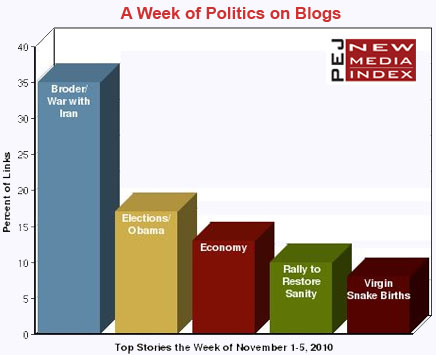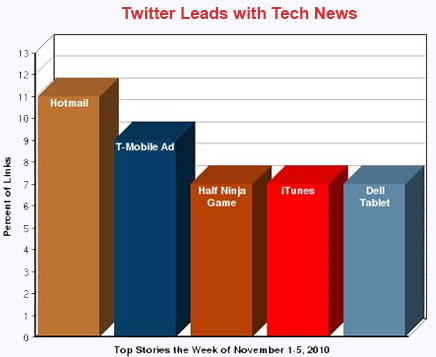
 Amidst mainstream press headlines of an angry and divided electorate, the blogosphere last week suggested there is at least one thing people across the political spectrum agree on: Going to war with Iran to boost the U.S. economy is a troubling idea.
Amidst mainstream press headlines of an angry and divided electorate, the blogosphere last week suggested there is at least one thing people across the political spectrum agree on: Going to war with Iran to boost the U.S. economy is a troubling idea.
During the week of November 1-5, bloggers across the board roundly rejected that kind of strategy. The idea came in an October 31 column by David Broder and attracted more than a third (35%) of the news links on blogs that week, making it the No. 1 subject according to the New Media Index from the Pew Research Center’s Project for Excellence in Journalism.
In the piece headlined “The War Recovery,” Broder—a longtime Washington observer with generally moderate views—wrote about ways that President Obama could bounce back from a difficult 2010 election to win a second term. Although Broder wrote he “was not suggesting that the president incite a war to get re-elected,” he also declared that if Obama spends the next two years “orchestrating a showdown with the [Iranian] mullahs…this will help him politically” and the “economy will improve.”
Online criticism of Broder’s piece produced a kind of blogosphere bi-partisanship and unanimity rarely seen on crucial political and policy issues. Some argued that the idea of starting a war for political or economic reasons was immoral. Others offered that if additional government spending would help the economy, the spending could be on things like infrastructure rather than military conflict
The second-biggest subject on blogs last week, with 17% of the links, was the November 2 elections and the political consequences for Obama, the overwhelmingly No. 1 story in the mainstream media. While much of the traditional press coverage focused on Washington’s changed political landscape in the wake of major Republican gains, the bloggers’ conversation focused more narrowly on columns that criticized Obama’s performance.
Most of that attention was to a piece by Washington Post columnist Charles Krauthammer, written prior to Election Day. These bloggers, like Krauthammer, were overwhelmingly critical of the President.
Another Washington Post column, this one by Federal Reserve Chairman Ben Bernanke, ranked third, at 13% of all links. In the column, Bernanke explained why the Federal Reserve responded to the economic crisis with “strong and creative measures.” The complex discussion that followed in the blogs split between those who feared Bernanke’s actions would lead to inflation and those who supported the more aggressive federal response.
The No. 4 subject, with 10% of the links, was the October 30 Rally to Restore Sanity and/or Fear in Washington, D.C., led by comedians Jon Stewart and Stephen Colbert. The rally, which drew about 200,000 people according to some estimates, received mixed reviews. Some bloggers supported Stewart’s vocal criticism of the news media and polarizing politicians while others felt it was nothing more than a liberal gathering in disguise. The same rally was also popular on YouTube, with Stewart’s closing speech being the third most-popular clip last week.
The No. 5 story on blogs, at 8%, was a BBC report about a female boa constrictor snake that scientists claim had 22 baby snakes with no father, thus making them “virgin births.”
On the social-networking site Twitter last week, all five of the top subjects focused on tech news and were based on reports from the website Mashable. 
The No. 1 story, with 11% of the links, focused on a new feature for Microsoft’s Hotmail which will allow users to receive and send emails from other email addresses, including ones from Gmail or Yahoo Mail. According to Mashable, Hotmail is the most popular email service, but it is facing competition from others like Google and Yahoo.
A report about a new ad for T-Mobile’s wireless network that makes fun of AT&T’s slower network speed was second at 9%.
At 7%, the third story alerted fellow Twitter users of a new mode for the iPhone game, Fruit Ninja. The popular game allows players to smash imaginary fruit on their phone’s screen.
That was followed by a report (at 7%) that Apple is planning on tripling the length of iTunes’ music previews from 30 seconds to 90 seconds and a preview of Dell’s new tablet computer, the Inspiron Duo, which will feature a full QWERTY keyboard (also at 7%).
The Broder Backlash
While David Broder’s October 31 column was not focused entirely on a potential war with Iran, it was that section that provoked anger throughout the blogosphere.
“I realize Washington Post columnist David Broder’s expiration date came and went some time ago,” summarized Dan Kennedy at Media Nation. “But suggesting that President Obama prepare for war with Iran in order to boost his re-election prospects is surely a new low.”
A number of bloggers questioned the ethics of such a proposition.
“Nowhere in the article does Broder question the morality of rattling war sabres in the name of economic growth,” wrote JJac at the Richmond Tea Party blog. “I am deeply troubled by the ease with which he suggests it, seemingly ignoring that fact that ‘rising tensions’ sometimes leads to actual war, with other people’s children sent off to kill and die in some foreign land.”
“Politics inevitably will play a role in war, but that role must come after the decision to wage war has been made on apolitical grounds,” declared Publius at The Fourth Branch. “The same is true with economics. Broder gets the process exactly backwards.”
Others said that there were different ways to increase government spending, which could help the economy without going to war.
“War is NOT the answer to our economic problems,” stated Jim Luke at EconProph. “The only way war can help economically is by increasing government spending dramatically. If we could do it for a war, then we can get the same benefits without the dead bodies, the broken families, and the destruction just by focusing our spending here on constructive stuff. David Broder should be fired.”
“This from a person [Broder] who has consistently opposed government spending and other Keynesian ideas for stimulus as inappropriate,” agreed Linda Beale at ataxingmatter. “War, he appears to think, is ok, but government spending on major public infrastructure is not? Now that is crazy.”
Many further questioned Broder’s role in the political conversation.
“In spite of his institutional stature, Broder’s mental capacities have in recent years come into question and his op-ed in the Washington Post on Sunday provides yet another occasion to wonder what is going on inside this man’s brain as he pushes for war against Iran,” asserted Paul Woodward at War in Context.
The Elections and Obama
Five days before the mid-term elections, conservative Washington Post columnist Charles Krauthammer criticized Obama for being a divisive figure responsible for his party’s impending losses in Congress.
Democratic pollsters Patrick H. Caddell and Douglas E. Schoen expressed a similar sentiment in a column condemning Obama for using the politics of polarization and resentment.
Conservative bloggers jumped in with their own attacks on the president.
“The great Charles Krauthammer wrote a column yesterday that really should hit home for what’s left of Obama’s supporters,” blogged DJ Tablesauce at Third Base Politics.
“Quite the uniter this president is,” remarked Kini at E Māua Ola i Moku o Keawe. “A democrat congress that dominates every bit of legislation. Unwilling to work with the Republicans on any legislation. They passed that monstrosity called Obamacare…Yet, Obama allowed No Compromise, No Republican Ideas, and Passed this crap sandwich against the will of the American people.”
“Democrats have to find someone to blame for Tuesday’s debacle,” predicted DrC at COTTonLINE two days prior to Election Day. “President Obama will be their target-in-chief. The blame-shifting has already begun…They [Caddell and Schoen] accuse him of behaving in an unpresidential manner, and of further dividing the country. These are probably fair criticisms.”
YouTube
The most viewed news video on YouTube last week was a six-minute


